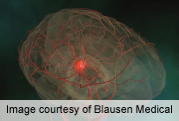- Could Your Grocery Store Meat Be Causing Recurring UTIs?
- Are You Making This Expensive Thermostat Error This Winter?
- Recognizing the Signs of Hypothyroidism
- 10 Strategies to Overcome Insomnia
- Could Artificial Sweeteners Be Aging the Brain Faster?
- Techniques for Soothing Your Nervous System
- Does the Water in Your House Smell Funny? Here’s Why
- Can a Daily Dose of Apple Cider Vinegar Actually Aid Weight Loss?
- 6 Health Beverages That Can Actually Spike Your Blood Sugar
- Treatment Options for Social Anxiety Disorder
Memory Lapses May Signal Stroke Risk: Study


Memory lapses in people with higher levels of education may be associated with increased stroke risk, researchers report.
The research included more than 9,100 people in the Netherlands, aged 55 and older, taking part in a long-term study. During the study, more than 1,100 of the participants suffered a stroke.
Overall, memory problems were independently associated with a higher risk of stroke. The researchers also found that people with memory problems had a 39 percent higher risk of stroke if they also had a higher level of education. However, the study did not prove a cause-and-effect link.
That level of risk is comparable to the association between memory problems and Alzheimer’s disease among highly educated people, according to the authors of the study in the current issue of the journal Stroke.
“Studies have shown how stroke causes memory complaints,” researcher Dr. Arfan Ikram, an associate professor of neuroepidemiology at Erasmus University Rotterdam in the Netherlands, said in a journal news release. “Given the shared underlying vascular pathology, we posed the reverse question: ‘Do memory complaints indicate an increased risk of strokes?'”
“Given the role of education in revealing subjective memory complaints, we investigated the same association but in three separate groups: low education, medium education and high education,” Ikram explained.
“We found that the association of memory complaints with stroke was strongest among people with the highest education. If in future research we can confirm this, then I would like to assess whether people who complain about changes in their memory should be considered primary targets for further risk assessment and prevention of stroke.”
Ikram said most of the study participants were white, and added that future research should include a wider range of races.
More information
The U.S. National Institute of Neurological Disorders and Stroke has more about stroke prevention.
Source: HealthDay
Copyright © 2026 HealthDay. All rights reserved.










